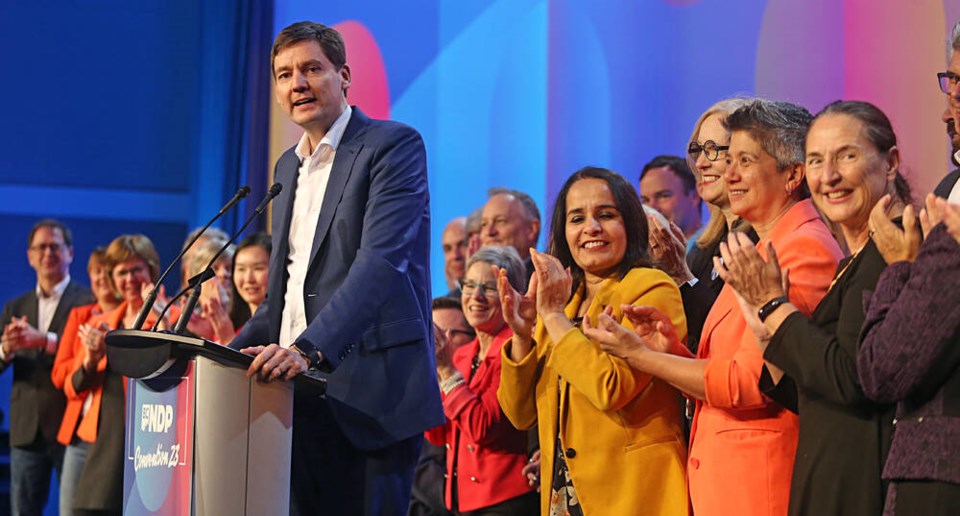Premier David Eby has a new tougher outlook on issues, a big new mandate as leader of the NDP — and a new baby on the way.
His wife, Dr. Cailey Lynch, broke the family news (expected in June, their third) to 703 delegates while introducing Eby at the party’s convention in Victoria on Saturday.
Eby followed up the personal news with pledges to keep people and families at the top of his agenda — “we’ve got your back” — and summed up his opponents’ strategies as “you’re on your own.”
He was speaking on the first anniversary of his swearing-in as premier, when he succeeded John Horgan by acclamation following the disqualification of his only opponent.
After making major multiple changes to housing policy in the past month, Eby said: “I wake up every morning thinking about what we can do, what other steps we take to tackle the housing crisis…”
He recalled his suburban childhood — when middle-class people bought decent homes, sent their kids to university, went on vacations and saved for the future. Now, he said, “middle-class families like the one I grew up in are barely hanging on.”
He said the foundation of “building a good life” is being able to afford a home.
The housing package at the legislature aims to restore that, Eby said, while the BC United Opposition’s plan can be summed up as “do absolutely nothing, and hope the market magically makes the housing crisis disappear.”
The NDP housing initiatives include abolishing single-family zoning over most of urban B.C., outlawing many short-term rentals, issuing blanket approvals for multiplexes near transit and bus stops, and curtailing public hearings on neighbourhood changes to speed development.
He said BC United Leader Kevin Falcon, a former BC Liberal cabinet minister who left politics to work in real estate development before returning, has opposed all their ideas.
“Those who have profited from the housing crisis, the climate crisis and the toxic drug crisis, they’re not going to go quietly,” Eby said. “Our opponents are going to throw everything they can in our way to keep everything that they want.”
Linking people who have made real estate profits by way of the housing shortage to drug dealers and polluters is his toughest language so far during the debate on the new measures.
In times of crisis, he later told reporters, there is a group of people who,“if government doesn’t respond, will take advantage of everyday people… It could be people buying up homes, keeping them empty as an investment…” It could be crassly campaigning against climate change initiatives or selling addictive opioids in order to make money.
Apart from the tough talk about speculators, Eby said he’s pleased by the broad support from people and local governments to date on the housing laws.
“It’s not universal but to have that local government support … and the understanding we have to take strong action … has been a relief, frankly, that everybody is on the same page.”
Prime Minister Justin Trudeau recently introduced some uncertainty into the national climate change effort by announcing some preferential treatment for different consumers paying the carbon tax.
Eby vowed to delegates: “If the rest of the country abandons the fight against climate change, B.C. will stand strong, because we know what the costs are.”
He then told reporters: “I make no secret of the fact that I think the federal government was incredibly ham-fisted in its carbon tax decisions. I think they’ve done a poor job of it.”
Trudeau’s move amounts to protecting dirty heating oil used to heat homes, when they should be protecting people by helping them off heating oil, Eby said.
He said his biggest frustration in his first year was on the public safety front, citing the Randall Hopley case. The convicted child abductor was on supervision when he violated the terms, but was released on bail even after that, then severed his monitoring device and was free for more than a week before being apprehended.
B.C. had earlier mounted a push for bail reform, but it hit federal legislative roadblocks over the past year. Eby said it is “wildly frustrating.”
After a year as an appointed premier, he won a 93 per cent approval rating from delegates at the convention. Now he’s at most 11 months away from the first time his premiership will be put to a vote, Eby is intent on painting opponents as cost-cutters who will reduce supports, while the NDP is determined to keep spending to look after people.




